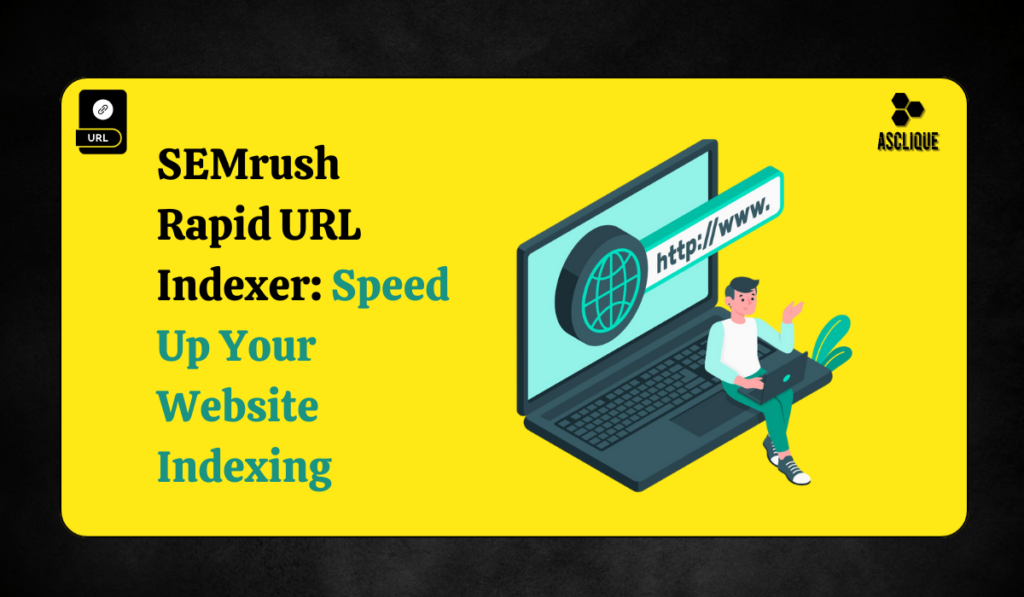One of the most important areas of search engine optimization is to get your web pages indexed as soon as possible. If a page is not indexed, then it will never show up in the search results; hence, no user will ever find it using organic search. Missed opportunities for traffic, engagement, and conversions may be the result of this.
All SEO professionals employ methods to speed up the process of indexing, and one of the most asked questions is whether SEMrush has a Rapid URL Indexer. SEMrush does offer a plethora of SEO tools to optimize for indexing, though it lacks the Rapid URL Indexer. Fortunately, there exist other means and tools through which the process could be accelerated.
This article shall cover:
- Why indexing matters and how it impacts SEO.
- How SEMrush tools help in optimizing indexing.
- What Rapid URL Indexer is and how it differs.
- The optimum means of URLs being indexed rapidly.
- Common indexing issues and solutions.
By the end of this guide, you will know exactly how to index your pages quicker using SEMrush, Rapid URL Indexer, and other indexing methods.
Understanding Indexing and How It Plays a Role in SEO
What an Indexing mean?
Indexing is the process used by different search engines such as Google to save and put web pages into their database. This is to make these pages appear in search results. That’s when the user searched for a particular keyword; it loads from its database those pages indexed in terms of that keyword, depending on other SEO parameters.
Without indexing means that a web page is not accessible by any search engines, meaning it won’t rank for anything.
How Google Indexes Web Pages
Google uses a three-stage process to index web pages:
- Crawling: Googlebot (Google’s web spider) crawls web pages via internal and external links.
- Indexing: The page’s content is parsed, stored, and tagged according to its keywords, structure, and usefulness.
- Ranking: Indexed pages are ranked on more than 200 parameters like keyword relevance, backlinks, and page speed.
If a page is not indexed, it will never show up in search engine results, so it is very important for webmasters to get their pages indexed as soon as possible.
Does SEMrush Offer a Quick URL Indexer?

Most SEO professionals ask if SEMrush offers a Rapid URL Indexer. The answer is no—SEMrush lacks a separate Rapid URL Indexer. Instead, it has a variety of tools that support indexing indirectly through improving the SEO effectiveness of a website.
How SEMrush Supports Indexing
Even though SEMrush lacks an instant index feature, it features the following for better indexability of your site:
- Site Audit Tool: Delineates the problem of broken links, crawl issues, and duplicated content, which can result in indexing errors.
- Backlink Analytics: It facilitates tracking and producing backlinks, which inform a page about its presence to Google’s crawlers.
- Content Marketing Toolkit: Aids the process of making content search-engine friendly so that the engines understand it better and rank it.
- SEO Dashboard: Offers information on how many pages are indexed and whether there are indexing issues that need to be resolved.
While SEMrush does not manually submit URLs for crawling, using these computer programs will better a site’s overall SEO health, encouraging it to get indexed sooner.
Understanding Rapid URL Indexer: Functionality & Benefits
Knowing Rapid URL Indexer
Rapid URL Indexer is a third-party tool that is designed to speed up the process of getting URLs indexed by search engines. SEMrush concentrates on enhancing site-wide SEO performance, whereas Rapid URL Indexer sends URLs to Google and other search engines for rapid indexing.
How Rapid URL Indexer Works
Rapid URL Indexer applies a number of tactics to speed up the indexing process, including:
- Pinging Services: Informs search engines of new or updated URLs.
- Google API Submission: Pass the URLs directly to Google’s indexing API.
- Backlinking & Social Signals: Enabling the formation of backlinks which enhance the chances of search engines crawling new URLs.
SEO specialists and webmasters tend to employ Rapid URL Indexer whenever they require prompt indexing for time-sensitive content like news stories or new product launches.
Best Practices on How to Get URLs Indexed Fast
Use Google Search Console
The fastest way of obtaining a URL indexed in a short time is by using Google Search Console (GSC).
Step-by-step procedure to Request Google to Index Using Google Search Console:
- Log into Google Search Console.
- Use the URL Inspection Tool and enter your new URL.
- Click “Request Indexing” to notify Google.
By submitting through Google Search Console, it is assured that Google will crawl your page instantaneously, thereby getting indexed in no time.
Submit a Sitemap to Google
A sitemap is an XML file that contains a list of all the important pages on your website. It helps search engines to discover and crawl new content easily.
Steps to Submit a Sitemap:
- Generate a sitemap using a plugin like Yoast SEO (for WordPress) or an online tool.
- Sign in to Google Search Console and navigate to the Sitemaps page.
- Provide your sitemap URL (e.g., https://yourwebsite.com/sitemap.xml) and submit it to accelerate the indexing process.
Submitting a sitemap informs Google to crawl and index new pages on your site on a continuous basis.
Build High-Quality Backlinks
Search engines crawl and index pages with high-quality backlinks from quality sites first.
How to Get High-Quality Backlinks:
- Publish guest articles on industry blogs.
- Be indexed in business directories and news portals.
- Publish posts on Quora, Medium, and LinkedIn for referral traffic.
You see that Googlebot crawls by following links, and having backlinks from index pages helps new pages index earlier.
Use Rapid URL Indexer and Other Indexing Tools
Apart from SEMrush, other tools have become expert in rapid URL indexing:
- Rapid URL Indexer – Using API submission and pinging services to index rapidly.
- IndexNow – A Microsoft utility that enables real-time indexing for search engines Bing and Yandex.
- OneHourIndexing – A paid service which claims to get URLs indexed in just one hour.
- LinkCentaur – Assists in bulk URL indexing and backlinking.
Although these tools can assist in expediting the process, care should be taken not to breach Google’s guidelines.
Post URLs on Social Media
Social media sites are crawled regularly by search engines, so they are a good method to drive traffic to new content.
Where to Post Your URLs for Quick Indexing:
Posting on Google My Business can also assist local businesses in getting their pages indexed quicker.
How to Identify and Solve Common Indexing Issues
Even if you use best practices, you may still encounter indexing problems. Here are some usual reasons why a page will not be indexed and how to resolve them.
| Issue | Solution |
|---|---|
| Noindex meta tag included | Delete the noindex tag on the page. |
| Blocked by robots.txt | Allow Googlebot to crawl the page. |
| Content is of low quality or duplicated | Enhance content quality and originality. |
| The website has crawl errors | Use Google Search Console to identify and fix crawl errors. |
| Poor internal linking | Internal link new pages from existing indexed pages to promote discovery. |
SEO for Companies: How to Make Your URLs Indexed Quickly
For businesses seeking to increase their internet presence, quick URL indexing is crucial. If search engines don’t index a page, the page becomes invisible in search, reducing potential traffic and customer engagement. To speed up indexing, companies need to implement SEO best practices and effective tools.
Best Practices for Getting URLs Indexed Quickly:
- Utilize Google Search Console: Manually submit URLs using the URL Inspection Tool and sitemap upload to aid in quicker discovery.
- Internal Linking Optimization: Create internal linking relationships between new and indexed pages for enhanced search engine crawling.
- Creating Quality Backlinks: Obtain quality backlinks from authoritative sites for credibility increase and quicker indexing.
- Using Social Media: Post new URLs on Facebook, LinkedIn, and Twitter to trigger crawl attention.
- Update Google My Business: Update posts and links to your website regularly to enhance visibility.
- Employ Indexing Tools: Employ tools like Rapid URL Indexer and IndexNow to notify search engines directly.
With these techniques, businesses can quickly index their web pages, leading to better rankings, increased website traffic, and increased brand authority.
Final Thoughts
For companies, fast URL indexing is vital to online exposure, search engine rankings, and user engagement. While SEMrush does not have a dedicated Rapid URL Indexer tool, it has several tools for SEO that increase indexability. By using Google Search Console, sitemap submission, building quality backlinks, and the use of third-party indexers, businesses can significantly accelerate the process of indexing.
An index website improves the attainment of search engine exposure, organic traffic, and authentic brand. Properly indexing your URLs should rank as one of the essential aspects of your SEO program to gain the best digital growth and engage your target market suitably. Using these best practices, companies can remain in the top positions of the searches and generate higher qualitative traffic on websites.
FAQs
How rapidly does Google crawl a new URL?
Google will index a new URL within a few hours to a few weeks. The pace of its indexing is website authority, internal linking, backlinks, and URL submission through Google Search Console.
Does SEMrush possess a Rapid URL Indexer?
No, SEMrush does not have a built-in Rapid URL Indexer. It does, however, offer efficient SEO features such as Site Audit, Backlink Analytics, and Keyword Tracking that assist with website indexability and ranking improvement.
How can URL indexing be expedited best?
In order to facilitate faster indexing, companies must:
- Submit URLs through Google Search Console
- Upload and refresh their XML sitemap
- Implement internal linking to link new pages with existing indexed pages
- Create quality backlinks from quality sources
- Use third-party indexers such as Rapid URL Indexer or IndexNow
Why is rapid URL indexing so crucial for companies to undergo?
Fast URL indexing ensures the new published contents become accessible to search engines in due time to be able to influence rankings, acquire organic traffic, and result in user interaction. Quick URL indexing assures that companies can stay in the game of competition by making contents public in a timely manner.
Can faster indexing be helped by social media updates?
Yes, posting URLs on social media platforms like Facebook, Twitter, and LinkedIn can help search engines in discovering new content quickly. Social media sites are crawled by search engines on a regular basis, thus providing more opportunities for your URL to be indexed as early as possible.

